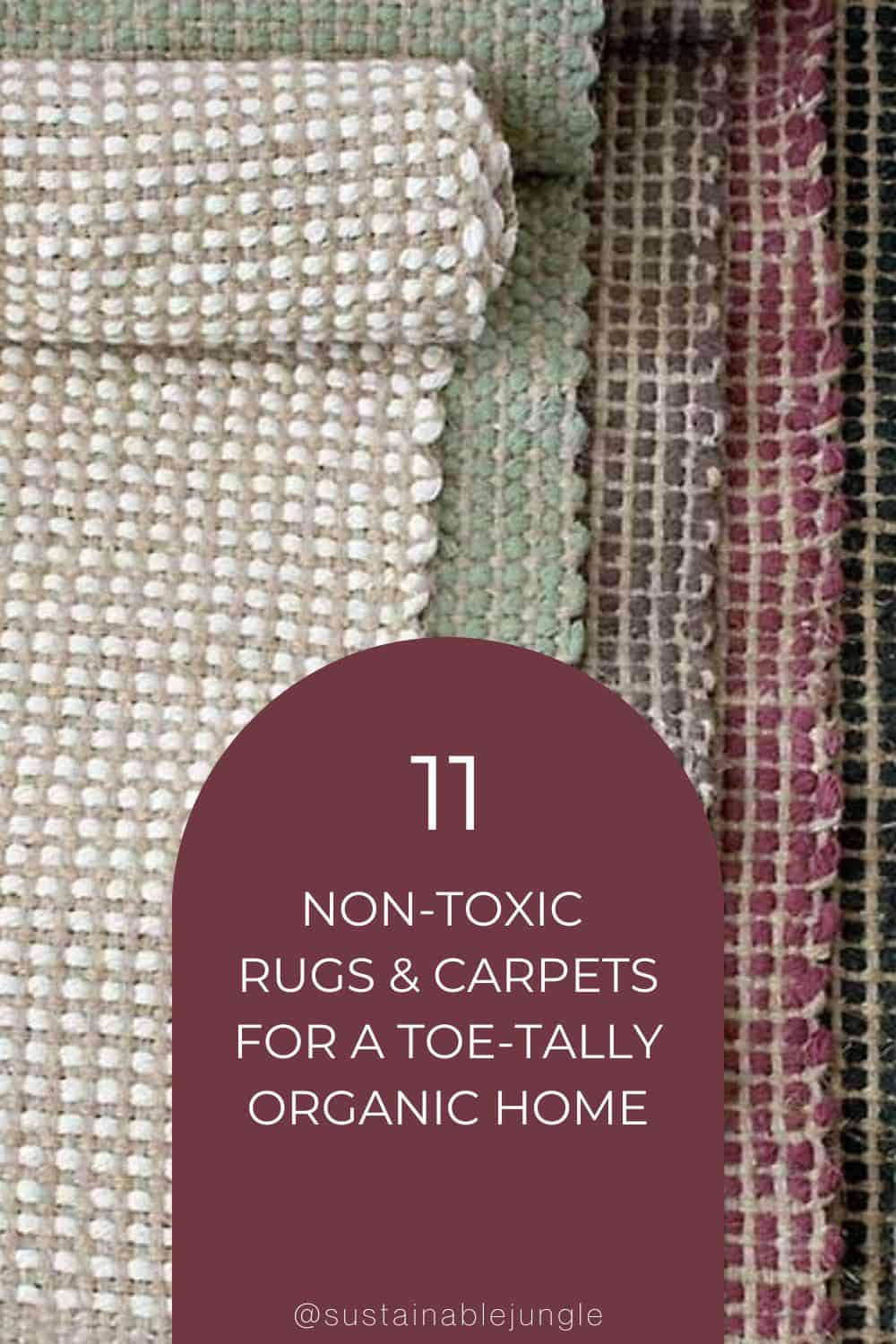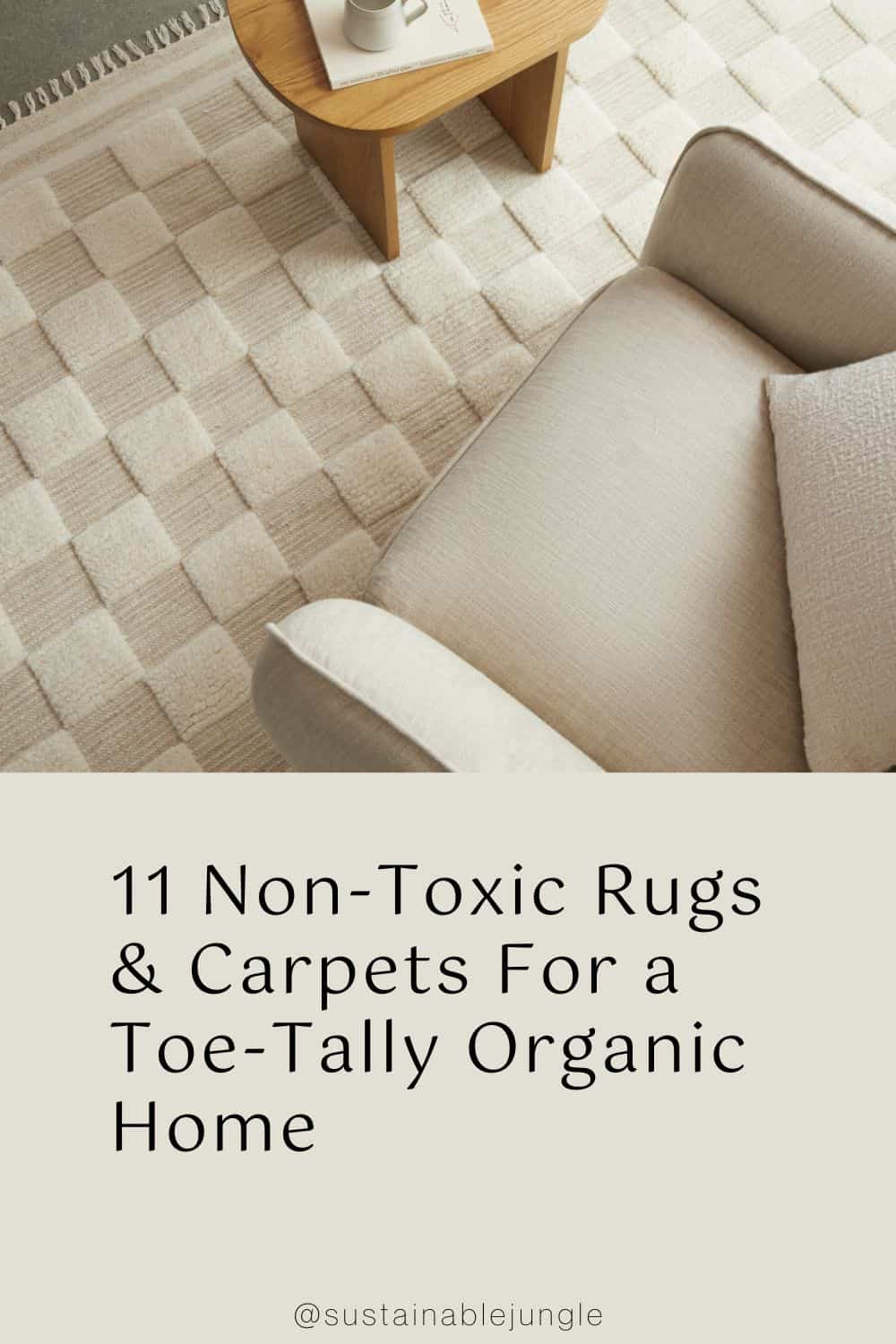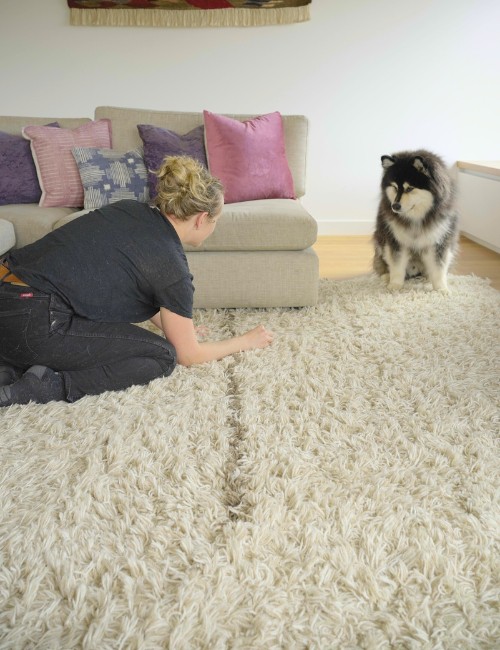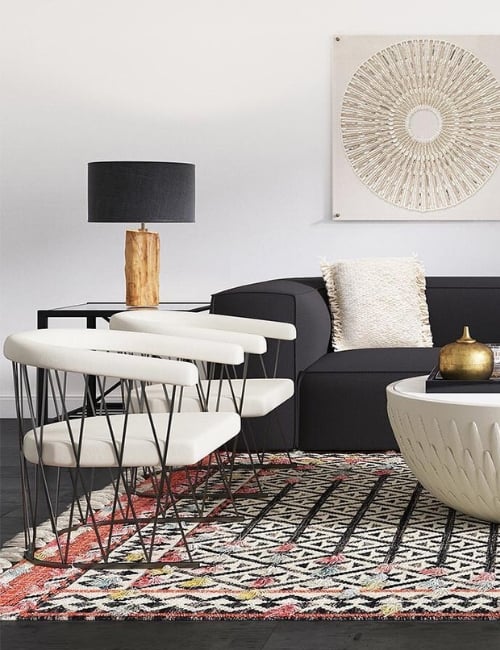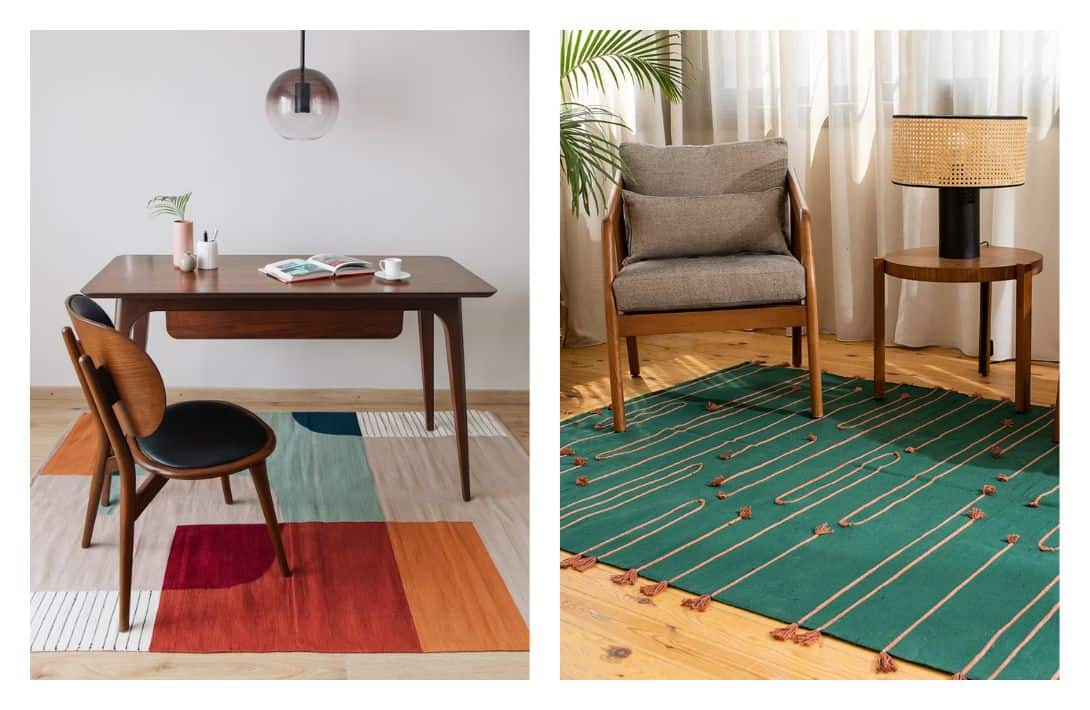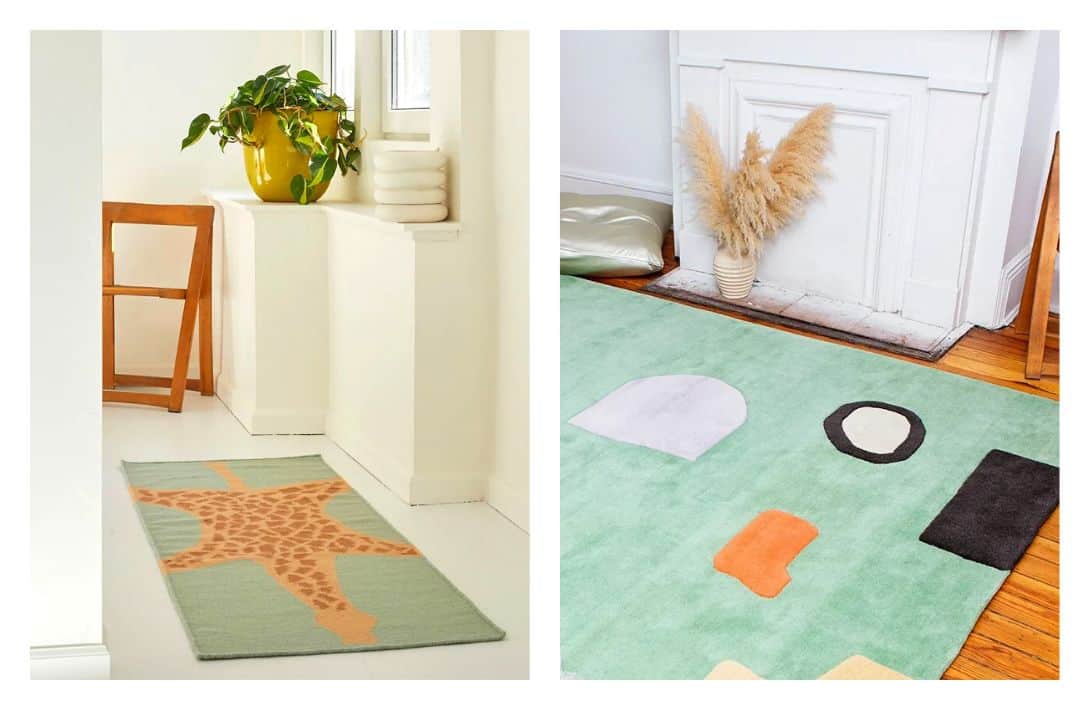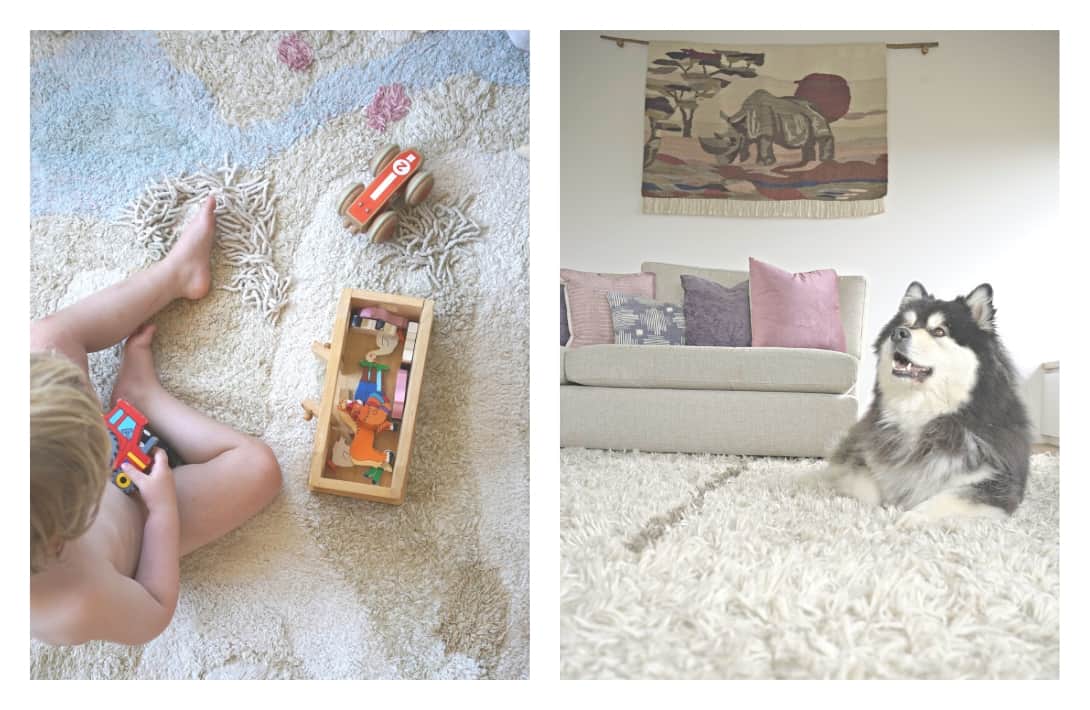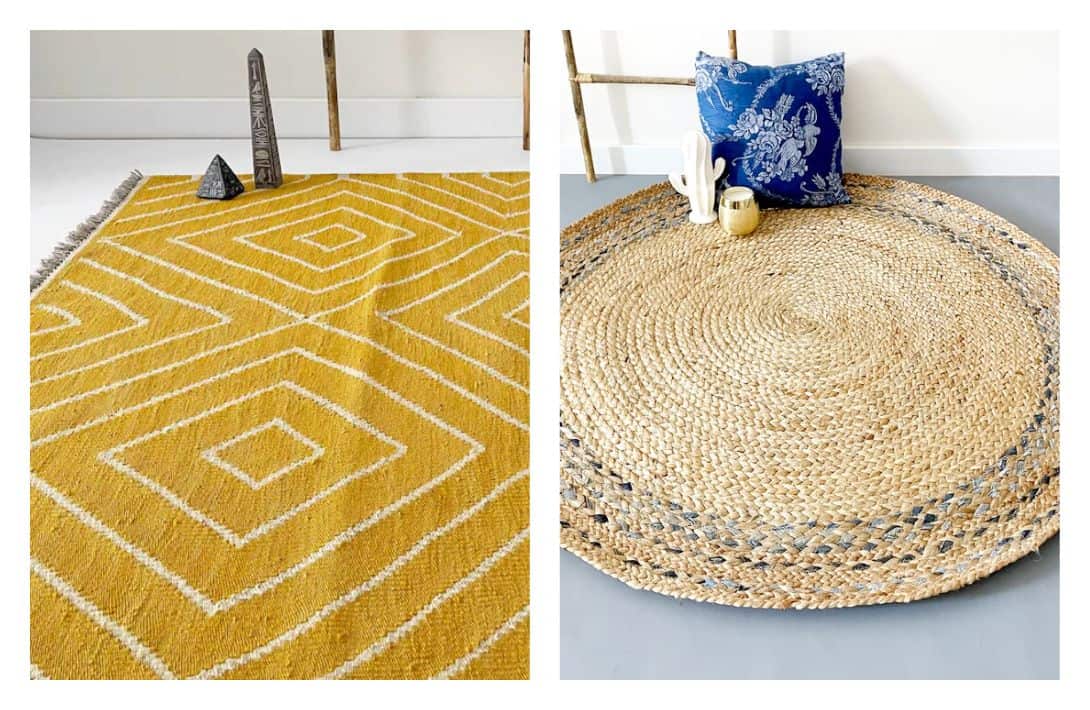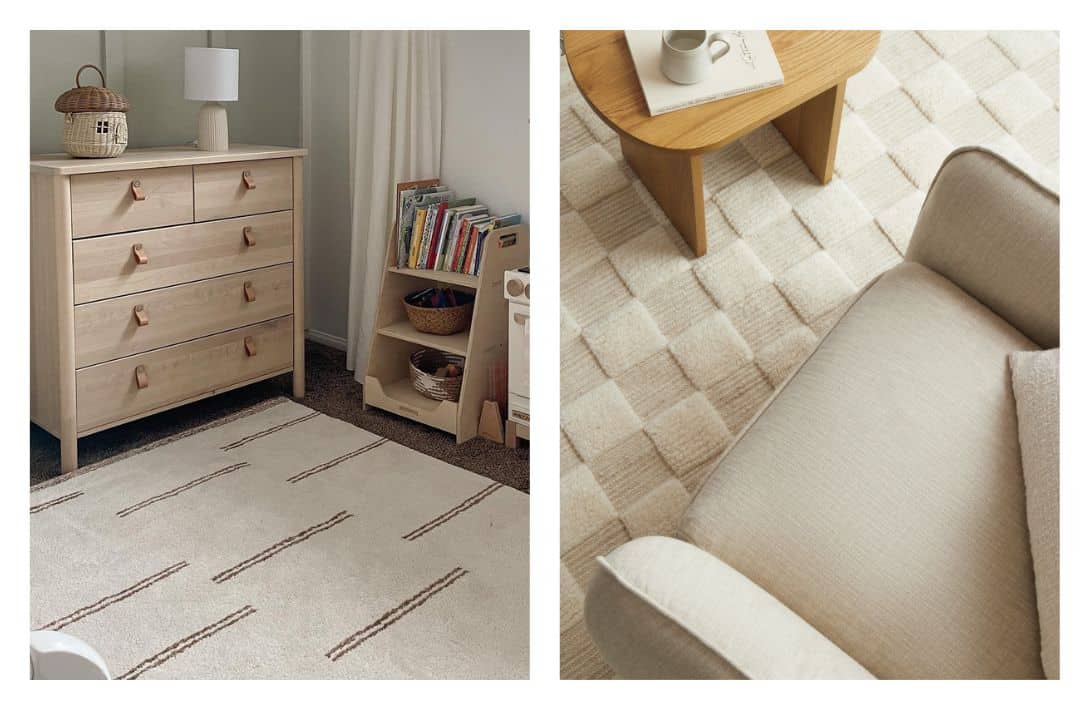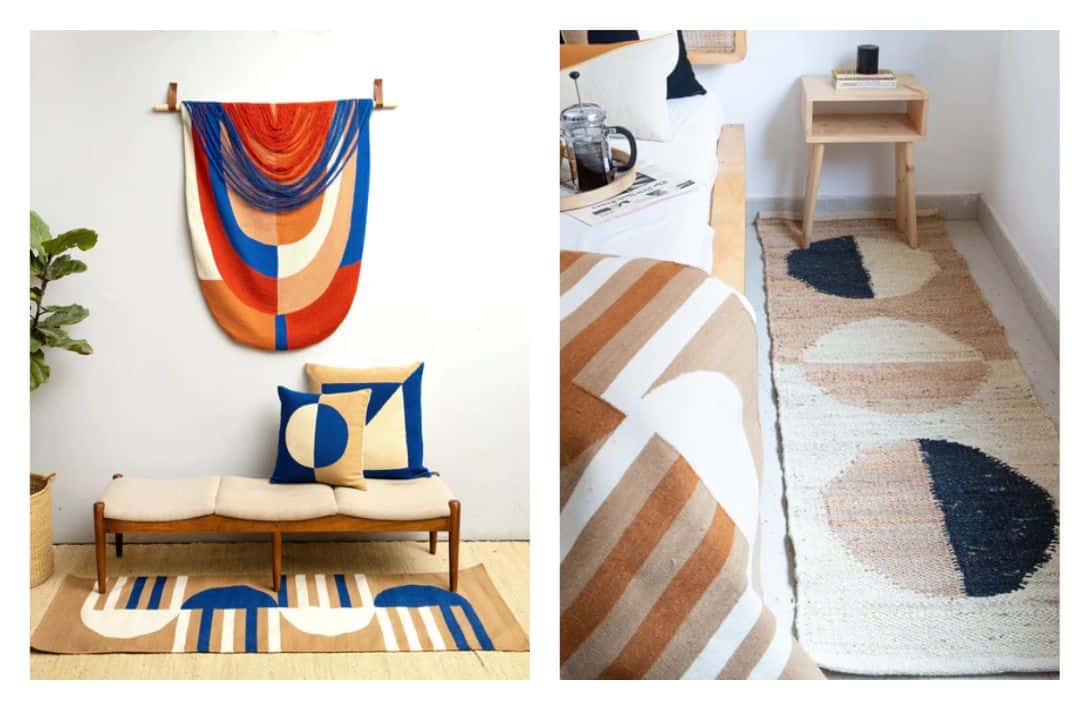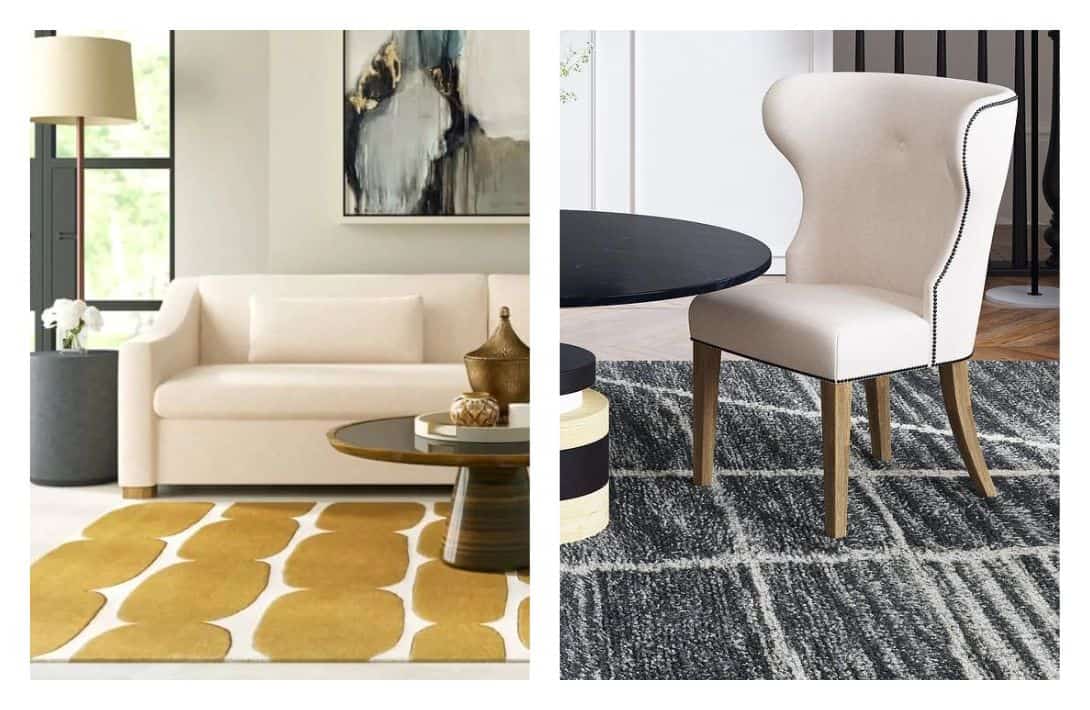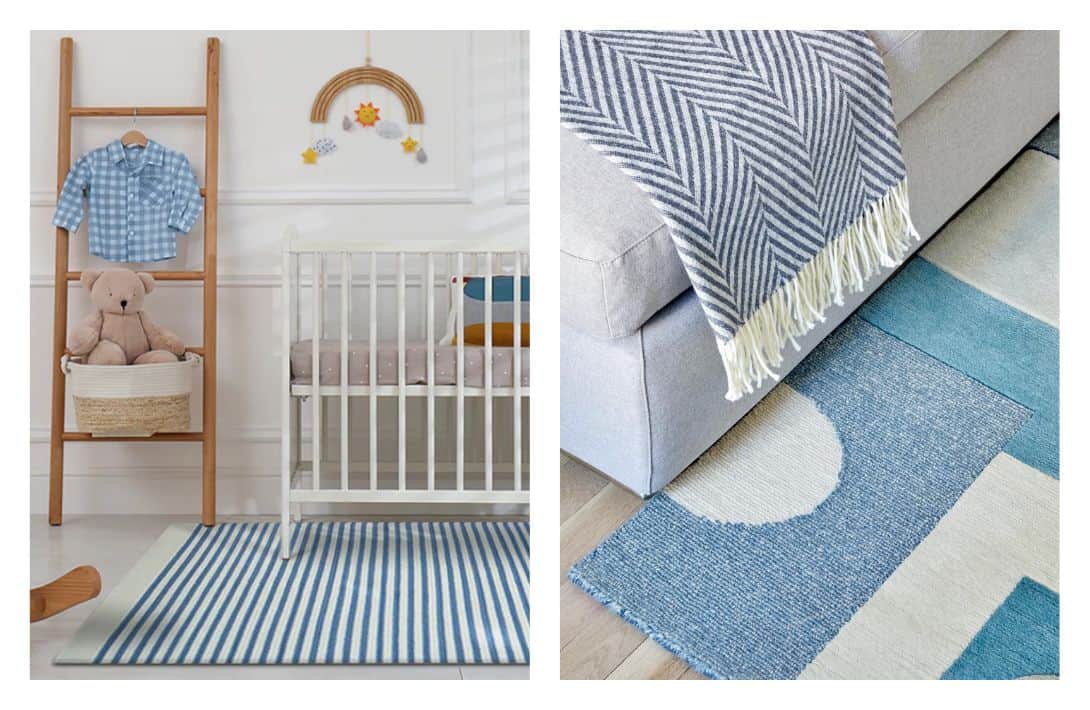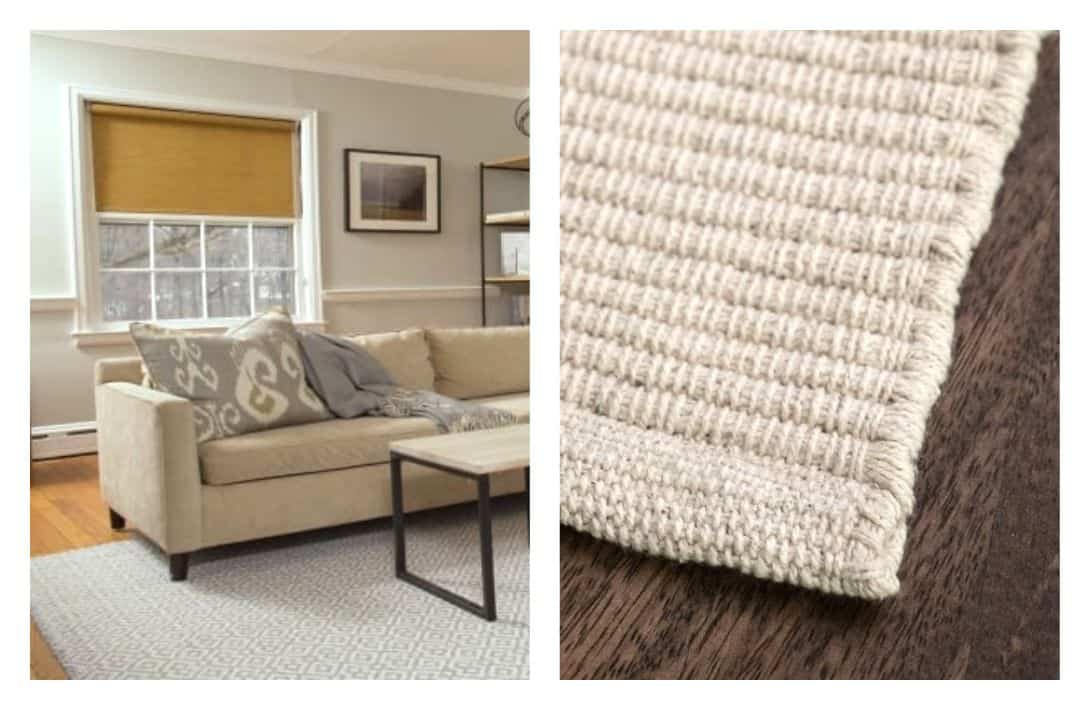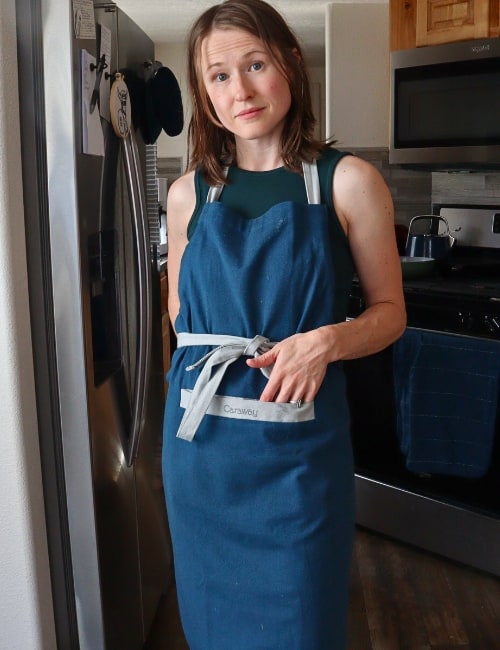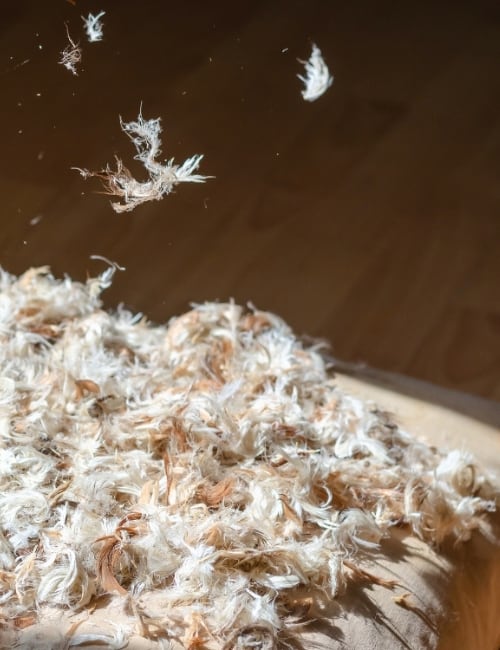9 Non-Toxic Rugs & Carpets For a Toe-Tally Organic Home
Playing tag around the eco-friendly coffee table, stretching out for movie night, playing twister on the floor—all fun activities made even more so when done on non-toxic rugs.
Why?
Because rugs are typically made of synthetic materials notorious for leaching VOCs and other toxic chemicals.
Fortunately, making your home non-toxic top to bottom is easier than you might think.
All you need is a solid foundation in the form of an organic rug and non-toxic rug pad.
Everything we recommend to you on Sustainable Jungle is independently researched and we ask all brands to confirm their claims. To avoid waste, we test products on an as needed basis. This post contains affiliate links. If you buy something through our links, we may earn a small commission. Learn more about why we do this here.
Have Some Floor Time With Our Favorite Organic Rugs
Fhygge’s organic cotton rugs will imbue every room in your home with hygge, thanks to natural fibers and a minimalist, Scandinavian design.
To add a little more flair to your floor, Leah Singh creates non-toxic wool rugs featuring bold colors and patterns.
The colorful, abstract designs from Cold Picnic can add some flavor to your floor while simultaneously keeping your home safe and toxin-free with natural materials.
But how can you tell which rugs are non-toxic?
We unravel our process at the end.
The Best Non-Toxic Rugs For Your Home
- Kiliim | Visit Store
- Cold Picnic | Visit Store
- Lorena Canals | Visit Store
- Fhygge | Visit Store
- Parachute | Visit Store
- Leah Singh | Visit Store
- Loomy | Visit Store
- Organic Weave | Visit Store
- Hook & Loom | Visit Store
1. Kilim
About Kiliim
Price Range: $79–$4,950
Kiliim is a Cairo, Egypt-based social enterprise that partners with the nearby town of Fowa, once a hub for kilim weaving until cheaper machine manufacturing created a major decline in the industry.
Kilim’s mission is to return to these hand weaving roots and “put Fowa back on the local and international map for authentic craftsmanship”.
Each all-natural rug design bears a unique blend of art deco inspiration with pharaonic forms, drawn together with vibrant colors like the gorgeous gold of the the Roots Wool Rug.
Kiliim’s Ethical & Sustainability Practices
Materials:
Fine quality wool, Egyptian cotton, and jute are found in these organic rugs, eachatop a non-toxic cotton rug base.
The beautiful colors come from colorfast natural dyes.
Supply chain & labor practices:
Every piece is handcrafted and flatwoven in Fowa Egypt, supporting not only Egyptian cultural heritage, but also local artisans, who are paid fair wages.
Carbon commitments & green practices:
Kilim partners with both Made Trade and Etsy, ensuring their rugs ship carbon-neutral regardless of shopping platform.
Kilim is also available on Etsy
2. Cold Picnic
About Cold Picnic
Price Range: $150–$1,950
For a toxic-free carpet so colorful and whimsical it will make you feel like you’re picnicking in a field of wildflowers, check out Cold Picnic.
They offer a complete range of home textiles, including throw pillows and blankets.
But their modern organic rugs are all the rage, whether you’re in need of something small like door mats and runner rugs or want to outfit your entire living room with the Outback organic wool area rugs.
Cold Picnic’s Ethical & Sustainability Practices
Materials:
These OEKO-TEX rugs are made of either New Zealand ethical wool, bamboo silk, or hemp (if you want an outdoor-friendly option).
Regardless, you’ll find no flame retardant chemicals.
Supply chain & labor practices:
Products are made at one of two factories in India.
Each one bears certifications from either GoodWeave and Care & Fair (C&F) or SA8000, GOTS, and GRS.
Carbon commitments & green practices:
Between manufacturing rugs using 100% solar power and reusing the packaging used in rug transport, they’re trying to keep emissions smaller than their compostable-packaged bath mats.
Community & charitable giving:
Cold Picnics rug factory in Indian funds a local school, and the brand itself donates proceeds from certain products to numerous nonprofits.
Some of their current collection features pieces from a contest for Black art and design students. The winners keep all profits.
3. Lorena Canals
About Lorena Canals
Price Range: $40–$995
Lorena Canals lays some real groundwork for what it means to be a sustainable rug brand.
This woman-owned company offers a collection of non-toxic area rugs and interactive play rugs for kids.
Our personal favorites are the Woolable Rug Autumn Breeze. We can’t get past the minimalist color palette which is a safe bet if you have, like us, an eclectic mix of decor. It’s also made of uber soft wool. We’ve had many a days (and nights) just lounging on the rug with our dog (picture above!).
As for the kids washable play rug, we couldn’t get passed the Path of Nature. The dynamic contours, colors and textures are such a complement to encouraging our little boy to explore his imagination. Add in a few props and toys and there’s a good chance this will provide a basis for hours of role play.
Lorena Canals’ Ethical & Sustainability Practices
Materials:
The materials used include conventional and recycled cotton, ethically sourced wool, and production scraps, all of which are dyed (if dyed at all) using OEKO-TEX and GOTS-certified dyestuffs.
Supply chain & labor practices:
Lorena Canals makes their rugs in ISO 9001, 14001, and 18001-certified facilities in India, where their mostly female artisans are paid and treated fairly.
Carbon commitments & green practices:
Between using 100% recycled and recyclable shipping bags, recycling all textile scraps to create the RugCycled® line, and recycling all water used in dyeing, LC ensures nothing goes to waste.
They also use a cone-dyeing process that is 75% more water efficient than traditional dyeing.
Community & charitable giving:
Through their Sakûla Project, Lorena Canals helps provide child care (including meals and education) for their factory workers.
They further support education by funding an Indian school.
4. Fhygge
About Fhygge
Price Range: $85–$900
Art, creativity, and sustainability: the trifecta behind Fhygge designs.
Based in Barcelona, Spain, the lifestyle-centered eco-friendly brand has a range of kilim-style woven tapestry rugs.
Choose from area rugs, runners, custom sizes, round rugs, and several multicolor non-toxic kids rugs.
Your home won’t just be clean of harmful chemicals and flame retardants, but will look clean thanks to their ivory-based color palette.
Fhygge’s Ethical & Sustainability Practices
Materials:
In addition to making wool and organic cotton rugs, Fhygge offers hemp or organic jute rugs.
Vegetable-based sustainable dyes are the foundation for their color schemes.
Unfortunately, their PVC rug pad isn’t suitable for those seeking non-toxic rug pads, so we recommend finding this elsewhere.
Supply chain & labor practices:
Though we have reached out, Fygge has not confirmed wool sourcing or supply chain details with us.
5. Parachute
About Parachute
Price Range: $129–$1,799
Parachute is here to save your home from free-falling into a toxic stew.
Like everything they sell, this woman-founded brand’s rugs are full of subtle neutrals, soft textures, and safe materials.
Shop round rugs, kilim rugs, and statement rugs, and chunky rugs—which are like organic shag rugs, but don’t scream “That 70s House”.
Our favourite pick? Their super soft and chunky Braided Wool Rug, which is “like a sweater for your floor”.
Parachute’s Ethical & Sustainability Practices
Materials:
Natural fibers like stain-resistant jute, wool (sourced from mulesing free farms in New Zealand), and cotton round out Parachute’s toxic-free rugs.
All rugs bear OEKO-TEX certification, ensuring they’re free of harmful chemicals.
Add a non-toxic rug pad made of recycled materials and a natural latex backing.
Supply chain & labor practices:
Rugs are handwoven by expert craftspeople in Panipat, India—otherwise known as the “city of weavers”—and some bear Craftmark certification.
Artisans are supported not only with fair wages, but with education for their children.
Carbon commitments & green practices:
Renewable energy projects help to keep the already-minimal footprint down in the 80-year-old factory.
Rugs are sent in 80% recycled eco-friendly mailers, but to prevent shipping waste from something you’re not 100% sure on, they offer sample swatches, too.
Community & charitable giving:
Through the Home For Dreams initiative, they offer professional training and grants for black-owned businesses.
Safe rugs aside, Parachute also helps keep people safe from malaria by donating to the UN’s Nothing but Nets campaign.
6. Leah Singh
About Leah Singh
Price Range: $250–$1,700
Leah Singh is bringing back some of India’s age-old, traditional crafts “by transforming them into modern objects”.
They’re doing so by partnering with fair trade artisans across six regions of India to create area rugs, small mats, and runner rugs like stunningly symmetrical geometric Luna Mod Wool Rug.
Leah Singh’s Ethical & Sustainability Practices
Materials:
Choose between a handwoven wool rug or jute rug, both dyed with AZO-free dyes.
Supply chain & labor practices:
All rugs are designed by Leah and her team in New Delhi, India. To make designs tangible, they partner directly with village artisans across India.
GoodWeave certification means the rugs were made without forced or child labor, and every purchase supports programs that provide respectable work for adults and education opportunities for children.
Carbon commitments & green practices:
Rugs are sent in biodegradable poly bags made from rice and potato starch.
7. Loomy
About Loomy
Price Range: $348–$10,500
Woman-founded Loomy is all about the topic of the day.
Natural rugs, performance rugs, pet-friendly rugs, indoor/outdoor rugs, vegan rugs, vintage rugs, you name it. There’s a rug for every room, including kids’ rooms—like the adorable Zebra Rug.
While we wouldn’t judge adults for also digging these cute organic kids’ rugs, their “adult” options come with no fewer varieties’ of sizes, designs, fun prints and patterns.
While not the most affordable non-toxic rugs in this list, these investment pieces will keep your home safe, warm, and joyful for years and years to come.
Loomy’s Ethical & Sustainability Practices
Materials:
Loomy uses either natural or recycled materials, all of which are OEKO-TEX certified and dyed with low-impact dyes.
These include cotton, ethically-sourced New Zealand wool, jute, sisal, hemp fabric, viscose, and banana silk, as well as upcycled plastic bottles.
Supply chain & labor practices:
“Loom to room” reflects their desire to achieve full traceability.
By working with indigenous communities and artisan weavers far and wide, they’re helping to preserve traditional skills and provide meaningful livelihood opportunities.
Carbon commitments & green practices:
Loomy’s non-toxic carpets are made by hand, in small batches, which reduces the amount of rug waste in landfills—which they say accounts for 2% (!) of all landfill waste in America.
Each one is made in a closed-loop manufacturing process, too.
8. Organic Weave
About Organic Weave
Price Range: $1,500–$10,800
As their name suggests, Organic Weave creates entirely organic rugs for anywhere in the home.
Their selection is large, featuring organic area rugs, shag rugs, statement rugs, circular rugs, and accent rugs, all in sizes up to 12 x 15 feet.
We’re feeling relaxed just imagining the cooling blues of the Rebel Soul rug blanketing our entire living room.
If you can’t find the perfect rug, they offer custom options, too.
Organic Weave’s Ethical & Sustainability Practices
Materials:
Sprawl out with your favorite sustainability book in peace knowing you’re doing it on GoodWeave and GOTS-certified rugs, whether you chose wool or cotton.
You won’t be resting in the company of pesticides, flame retardants, toxic detergents, and harsh chemicals.
They use plant-based non-toxic dyes (and do not bleach their fibers prior to dyeing) and wash them using non-toxic soap.
Supply chain & labor practices:
This “farm to floor” brand partners with talented artisans in India.
Founded with the goal of fighting the blatant child labor in India’s rug industry, they only work with child-labor-free partners.
Carbon commitments & green practices:
Organic Weave rugs are entirely handmade, using either hand-tufting, hand-knotting, or flat weaving techniques. Their hand-knotted wool rugs are heirloom quality.
9. Hook & Loom
About Hook & Loom
Price Range: $42–$1,965
For Hook & Loom, our planet comes first—but human health is a close second. They write:
“Just as our workplace will be safe to weave in, our products will be safe to roll around on.”
Choose between any size—door mats to non-toxic area rugs—and different traditional techniques, including loom-hooked, flatweave, and braided. They’re also one of the few non-toxic nursery room rug brands.
You can peruse their guide to help you find the right one for your home (or baby).
Hook & Loom’s Ethical & Sustainability Practices
Materials:
Hook & Loom rugs are sans flame retardants, harmful detergents, pesticides, off-gassing latex, plastic backing, or finishing sprays.
What you will find is recycled cotton (which may contain minimal percentages of polyester), undyed natural wool, and GOTS-certified organic rugs made of cotton.
The organic wool rugs are extra special because they use “No dyes. Ever.” But undyed wool doesn’t mean white. Colors come from the natural color variants in different coats.
Supply chain & labor practices:
The rugs are made by fairly compensated employees, never with child or forced labor.
Carbon commitments & green practices:
In place of backing and adhesives, all rugs are handwoven and hand-bound.
This also makes the flatweave rugs reversible. Instead of buying an extra rug to switch things up, just flip it over.
Community & charitable giving:
A portion of all sales is donated to Water For People, which ensures Indian communities have access to clean, potable water.
Did you know we Have a Newsletter?
We cover the latest in sustainable living, fashion, zero waste, beauty, travel, finance and more…
Why Choose An All Natural Non-Toxic Rug?
Most conventional rugs are made with plastic, releasing toxic chemicals into your personal sanctuary.
That’s not even to mention other chemicals, like toxic dyes, endocrine disruptors, flame retardants, and backing adhesives that contain formaldehyde…
Finding chemical-free rugs and organic carpets is all well and good in theory, but how do you actually do it?
With all the greenwashing out there, how can you know you’re actually getting a safe rug?
For instance, the popular brand Ruggable claims to make 100% non-toxic rugs, but given they’re made of nylon or polyester, how true can that be? How toxic are Ruggable rugs?
Well, the pads are coated with a waterproof PVC film, and given the numerous health hazards associated with PVC, that’s enough for us to rag on these rugs.
Then there’s another common confusing rug material: polypropylene. Are all polypropylene rugs toxic?
While the EPA considers it safer than other types of plastic, a polypropylene rug may still contain trace amounts of BPA.
What’s more, studies have shown polypropylene can affect androgen hormones, which causes a cellular toxic response.
How We Found These Non-Toxic Natural Fiber Rugs
While organic wool area rugs certainly aren’t as sexy as sustainable lingerie (oh-la-la!), we should still give them as much thought as we do sustainable fashion.
That’s why the same criteria laid the groundwork for us to assess these rugs for even the most sensitive areas of our home.
Materials:
Instead of plastic, we wanted to stomp, sit, sulk, or stretch out on natural materials: organic cotton, recycled cotton, wool, hemp, jute, fique fiber, and sisal.
Fabric is only as good as its finishes, so we made sure to look for rugs that contained AZO-free or natural, non-toxic dyes and either natural latex or natural rubber backings.
We also wanted to see no or low-VOC rugs, meaning no harsh chemicals will degrade your indoor air quality.
We didn’t find any truly organic rug pads, but we did at least find rug pads made of recycled materials.
- Certifications: Global Organic Textile Standard (GOTS), OEKO-TEX, Global Recycle Standard (GRS)
Supply chain & labor practices:
Child labor is rampant in the rug industry, so we wanted to make sure these rugs were made by willing adults who are treated and compensated fairly for their enormous efforts (i.e. fair trade rugs through and through)
Sourcing also matters. For instance, if you’re choosing a non-toxic wool carpet, you want to make sure the wool is ethically sourced from cruelty-free farms.
- Certifications: GoodWeave, Care & Fair (C&F), Craftmark, Social Accountability International (SA8000)
Carbon commitments & green practices:
The brands on this list all created handmade rugs using traditional, hand techniques, which not only helps preserve these ancient cultural skills but reduces the need for machinery and the carbon footprint associated with it.
The few that did utilize weaving machines used renewable energy to power them.
We also like seeing carbon offset programs to account for shipping, especially since rugs are large and heavy.
Community & charitable giving:
A dream to improve the world at large lays the groundwork for an ethical brand. While not all are big enough to be brands that give back, we were happy to see some allocating profits to charity.
Final Thoughts On Non-Toxic & Organic Rugs
How often do you come into contact with your rug?
Probably more often than you think.
You can’t sweep toxins under your synthetic rugs, but you can keep them from dirtying your home by choosing safe and non-toxic rugs and using eco-friendly carpet cleaner.
Home should feel like “home”—not a lab experiment.
If you have friends or family members who might agree, gently pull the rug out from under their feet by sharing this list.
Pin these:
